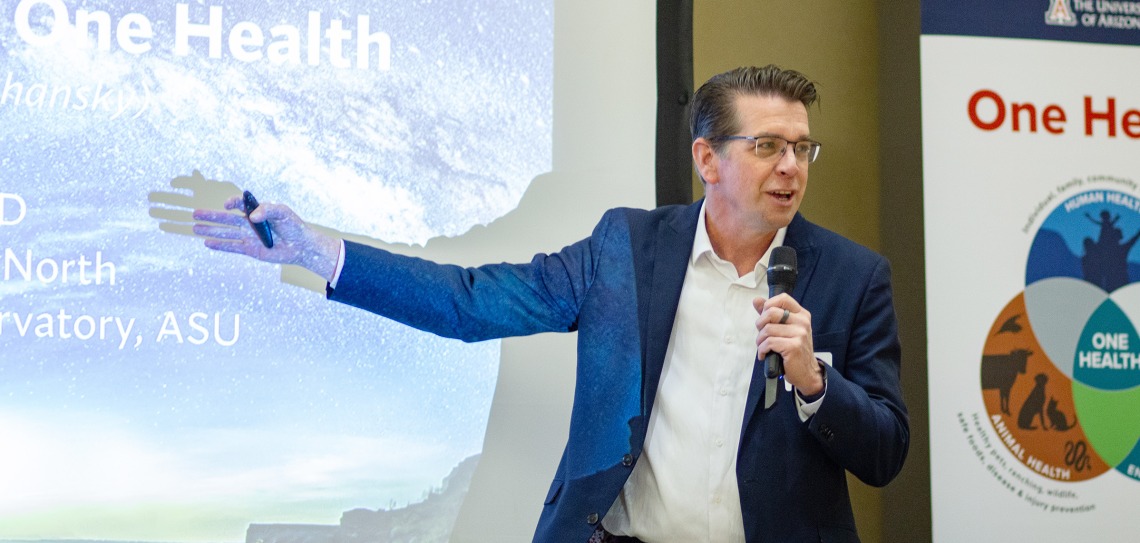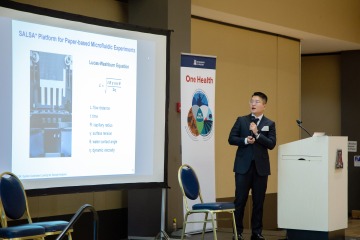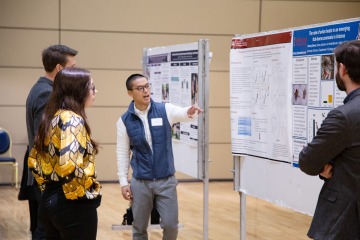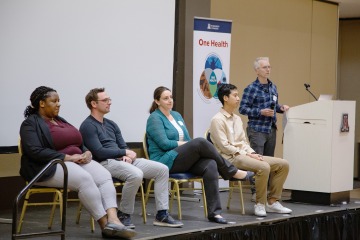One Health Symposium, Winter 2025: Advancing Collaborative Solutions for Global Health

The recent 2025 One Health Symposium brought together researchers, postdoctoral fellows, and graduate students from across the University of Arizona to share presentations on their interdisciplinary One Health research and discuss future collaborative research to solve health challenges in Arizona and globally.
The 2025 One Health Symposium brought together leading researchers, postdoctoral fellows, and graduate students from across the University of Arizona on Friday, February 7, at the UA Student Union North Ballroom for a day of cutting-edge scientific discussions and interdisciplinary collaboration. This annual event, coordinated by the One Health Research Initiative and hosted by the University of Arizona Health Sciences and the Zuckerman College of Public Health, highlighted the crucial intersections between human, animal, and environmental health in tackling today’s most pressing global health challenges.
The symposium opened with a continental breakfast, setting the stage for a dynamic day of research presentations. Dr. Frank von Hippel, Director of the One Health Research Initiative at the university, welcomed attendees with opening remarks, emphasizing the importance of collaboration in addressing complex health issues.
The morning sessions featured compelling oral presentations by Postdoctoral Fellows and Pilot Project researchers, covering diverse topics such as PFAS remediation, blister beetle toxin applications for cancer treatment, wildfire contamination, and global health interconnections.
After an engaging Q&A session, attendees reconvened for an impactful afternoon of research discussions, including environmental surveillance of influenza A, the effects of tropical cyclones on human and environmental health, and psychiatric service dogs for PTSD therapy. Each presentation highlighted the One Health approach, emphasizing the interconnectedness of human, animal, and environmental health and demonstrating how scientific innovation, environmental stewardship, and public health strategies converge to drive meaningful change.
Graduate Research Fellows contributed through poster presentations, offering insights into zoonotic diseases, antibiotic use in animal shelters, Indigenous food security, and microbial water monitoring in Tanzania. These projects underscored the breadth of One Health research and its direct impact on communities worldwide.
A highlight of the symposium was the keynote address by Dr. David Engelthaler, Director of TGen North and an expert in immunology and microbial genomics. His talk, “Nothing in Valley Fever Makes Sense Except in the Light of One Health,” provided a deep dive into the complex interplay between the environment, infectious diseases, and human health. He highlighted how climate change, land use, rodent burrows, and microbial evolution influence the spread of Valley Fever, a fungal infection endemic to arid regions. His engaging presentation reinforced the urgent need for interdisciplinary solutions in disease prevention and management.
The symposium concluded with closing remarks from Dr. Frank von Hippel, followed by a networking reception. The reception provided an opportunity for attendees to continue discussions, explore potential research collaborations, and reflect on the day’s key insights.
As the 2025 One Health Winter Symposium ended with informal discussions, it was evident that the event had once again succeeded in fostering meaningful dialogue, knowledge exchange, and collaborative partnerships. The research showcased this year underscores the transformative power of a One Health approach, proving that tackling global health challenges requires breaking down traditional disciplinary barriers.
The One Health Research Initiative looks forward to continuing its mission of integrating science, policy, and innovation to improve health outcomes worldwide.



Winter 2025 One Health Symposium Presentations
Morning Session Presentations: Pilot Projects and Postdoctoral Fellows
Detection and remediation of PFAS by counterplotting PFAS transport mechanisms in the human body
Seung Ju Choi, PhD
National Research Foundation of Fellow in the School of Sustainable Engineering and the Built Environment, Arizona State University
Chemical modification and repurposing of blister beetle toxins to treat cancer
Kevin Andre Scott
Postdoctoral Research Associate III, College of Medicine – Tucson, University of Arizona
Impacts of heat stress on ADME processes
Paxton Sample
Doctoral student, Pharmacology and Toxicology, University of Arizona
Impact of a prior SARS-CoV-2 infection on the vaginal microenvironment
Pawel Laniewski, PhD
Research Scientist, College of Medicine – Phoenix, University of Arizona
One breath in the wake of wildfires: dust generation and contaminant exposures from the release and remobilization of contaminants
Mónica Ramírez-Andreotta, PhD, MPA
Assistant Professor of Soil, Water and Environmental Science (SWES) with a join appointment in the Zuckerman College of Public Health at the University of Arizona
Animal models of adverse respiratory and reproductive health effects of environmental fire smoke exposure
Zelieann R. Craig, PhD
Associate Professor, Animal & Comparative Biomedical Sciences, University of Arizona
Exposure to toxic metal(loid)s via breastmilk and stunting in infants living in the Lake Atitlán watershed, Guatemala
Sandra F. Rodriguez Quintana, MD, MPH
Postdoctoral Research Associate, Zuckerman College of Public Health, University of Arizona
Afternoon Session Presentations: Pilot Projects and Postdoctoral Fellows
Advancing environmental surveillance: tracking influenza A virus circulation through a One Health lens
Kelly A. Reynolds, PhD
Professor and Chair of the Department of Community, Environment and Policy in the Zuckerman College of Public Health, and also Director of the Environment, Exposure Science and Risk Assessment Center (ESRAC), University of Arizona.
Exploring the epidemic landscape: spatial models predict phenological shifts in mosquitoes and West Nile Virus emergence
Desiree Andersen, PhD
Postdoctoral Researcher, School of Natural Resources and the Environment, University of Arizona.
Identifying the edaphic factors controlling the presence of the fungi Coccidioides spp. in soils of the Sonoran Desert
Nastasia Baudin, PhD
Postdoctoral Research Associate, Environmental Science, University of Arizona.
Targeted assessment of disinfection-resistant adenoviruses in water purification processes for potable reuse
Walter Q. Betancourt, PhD
Associate Research Professor, Environmental Science, and researcher with the Water & Energy Sustainable Technology Center, University of Arizona
Psychiatric service dogs and prolonged exposure therapy for military-connected PTSD: a transdisciplinary, One Health approach
Sarah Leighton, MS
Doctoral student in Social and Personality Psychology and One Health Research Fellow, University of Arizona
Inequities in post-hurricane recovery patterns across sociodemographic dimensions
Chris Lim, PhD
Assistant Professor, Environmental Health Sciences, Zuckerman College of Public Health, University of Arizona
Understanding the impact of tropical cyclones on human and environmental health
Osaretin Atinuke Olurotimi, PhD
Assistant Research Professor, Department of Agricultural and Resource Economics, University of Arizona
Sustaining people and livestock through cultivating water resilience with communities in arid lands
Joseph H. Hoover, PhD
Assistant Professor, Environmental Science, University of Arizona
Graduate Student Poster Presentations
Accumulation of Metals and Metalloids in Sediment and Aquatic Organisms of Ecuadorian Mangrove Forests and Implications for Public Health
Karla Ajoy
PAWS Project: Designing a Mixed-Methods Approach to Studying Antibiotic Prescribing in Animal Shelters
Paulina Marie Colombo
The role of avian hosts in an emerging tick-borne zoonosis in Arizona
Henrey Deese
A New Kind of Partner: Exploring the Impact of Facility Dogs in Law Enforcement
Molly Delzio
Military contamination of subsistence foods and threats to Indigenous food security
Zoe Demitrack
Characterizing dog cognitive aging using spontaneous problem-solving measures
Stephanie Hargrave
Sleep-Wake Dynamics in Veteran-Service Dog Dyads: An Exploration of Overnight Concordance
Sarah Leighton
Changes in Metabolic Profile by Wildland-Urban-Interface (WUI) Fire Exposure in Firefighters & Mice
Tuo Liu
Microbial water monitoring in hotspot communities for V. cholerae in Dar es Salaam, Tanzania
Victor Ugbede Okpanachi
Occupational Experiences of beedi workers in India – A Photovoice Study
Priyanka Ravi
Manipulating B5 in the Mosquito to Prevent Malaria Development
Brendan Riske
Exposure to toxic metal(loid)s and microbial pathogens via drinking water in communities of the Lake Atitlán watershed, Guatemala
Yunuen Soto Fernandez
DNA damage repair impairment in Hereditary Leiomyomatosis and renal cell cancer
Ben Stansfield
Interactions between Water, Sanitation, and Hygiene (WASH) and mosquito dynamics in western Kenya: Implications for diarrheal and mosquito-borne diseases
Noriko Tamari
Chemicals and Heavy Metals in Human, Animal, and Aquatic Environments in La Pesca, Mexico
Priscilla Valenzuela

